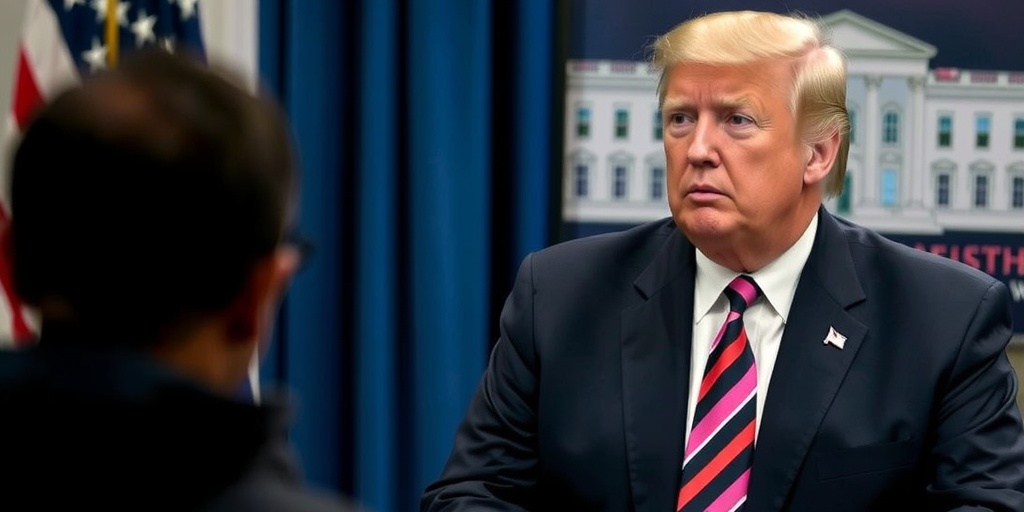Now Reading: Trump Signs Government Funding Bill, Says Spokesman
-
01
Trump Signs Government Funding Bill, Says Spokesman
Trump Signs Government Funding Bill, Says Spokesman
Headline: President Trump Signs Crucial Government Funding Bill, Averting Shutdown
In a decisive move on Saturday, President Trump signed a critical government funding bill passed by the Senate just a day earlier, as confirmed by a White House spokesperson. This timely action came just hours before a looming midnight deadline that threatened to shut down the federal government.
The signing of the bill concluded a particularly tumultuous week on Capitol Hill, marked by intense debates and negotiations. On Tuesday, the House of Representatives successfully passed the legislation aimed at funding the government through September 30. This vote was largely along party lines, highlighting the tensions within the Republican Party as fiscal conservatives struggled to reconcile their spending concerns with their support for President Trump. The final tally in the House was 217 in favor to 213 against, with only one Republican, Representative Thomas Massie from Kentucky, breaking ranks to vote against the legislation. Conversely, there was a rare bipartisan moment, as one Democrat, Representative Jared Golden of Maine, crossed the aisle to support the bill.
Following its passage in the House, the legislation moved to the Senate, where deliberations ensued throughout the rest of the week. Senators were faced with a critical decision: either accept the Republican bill from the House or risk a government shutdown, which would take effect at 12:01 a.m. on Saturday. The stakes were high, and the political atmosphere was rife with tension as lawmakers grappled with the implications of a potential funding lapse.
The pivotal moment in the Senate came on Friday afternoon, amid various expressions of dissent within the Democratic Party. The procedural vote was essential to ending debate on the funding bill and advancing it to a final vote. Given the standing divisions within their ranks, some Democrats were required to support the legislation to prevent a filibuster and ultimately avert a government shutdown. Senator Chuck Schumer, the Democratic leader, along with nine other members of his caucus, stepped forward to supply the necessary votes. Their decision reflected a pragmatic approach to governance, prioritizing immediate solutions over partisanship in a time of crisis.
When the Senate voted on the spending measure, the outcome was 54 in favor and 46 against, aligning almost entirely along party lines. This decisive vote underscored the ongoing divisions within Congress but also illustrated the urgency lawmakers felt to prevent a shutdown that could have had severe repercussions on federal operations and services.
The passage of the funding bill not only secured the financial operations of the government for the next several months but also demonstrated a willingness from some lawmakers to make difficult compromises for the sake of governance. Many members of Congress understood the detrimental effects a shutdown could have on both public sentiment and the economy, prompting the necessary action to mitigate these risks.
After the bill’s signing, President Trump expressed his approval, emphasizing the importance of keeping the government running and fulfilling the responsibilities toward American citizens. His administration viewed the successful passage of the legislation as a significant political victory, particularly in light of the challenges faced in the run-up to the vote.
In the weeks leading up to this funding bill, varying factions within both parties engaged in negotiations, discussions, and sometimes contentious debates. The outcome of these dynamics hinted at the ongoing challenges Congress may face regarding budgetary issues and broader political divisions, especially as they prepare for future negotiations on more comprehensive spending and funding mechanisms.
The collaboration across party lines seen in the Senate, albeit limited, serves as a potential guideline for future legislation as lawmakers must navigate increasingly polarized environments. The political landscape remains challenging as congressional members strive to address the needs of their constituents while balancing party loyalty and fiscal responsibility.
As the nation moves forward, many will be watching the implications of this recent funding bill and the negotiations that led to its passage. The ongoing complexities of governance amidst political polarization are likely to shape future discussions around fiscal policy and legislative priorities as both parties grapple with maintaining their platforms while addressing the immediate needs of the government and the American people.
Stay Informed With the Latest & Most Important News
Previous Post
Next Post
Previous Post
Next Post
-
 01New technology breakthrough has everyone talking right now
01New technology breakthrough has everyone talking right now -
 02Unbelievable life hack everyone needs to try today
02Unbelievable life hack everyone needs to try today -
 03Fascinating discovery found buried deep beneath the ocean
03Fascinating discovery found buried deep beneath the ocean -
 04Man invents genius device that solves everyday problems
04Man invents genius device that solves everyday problems -
 05Shocking discovery that changes what we know forever
05Shocking discovery that changes what we know forever -
 06Internet goes wild over celebrity’s unexpected fashion choice
06Internet goes wild over celebrity’s unexpected fashion choice -
 07Rare animal sighting stuns scientists and wildlife lovers
07Rare animal sighting stuns scientists and wildlife lovers



















